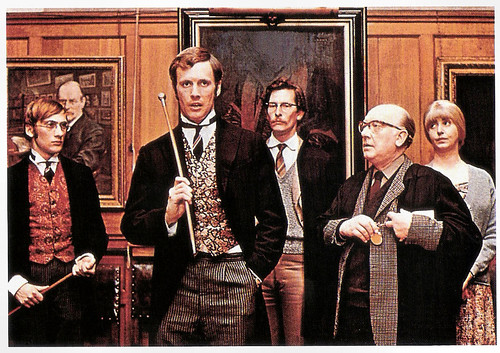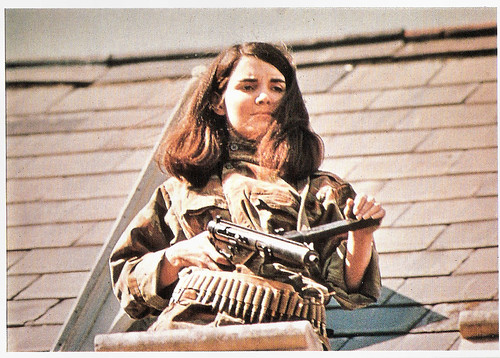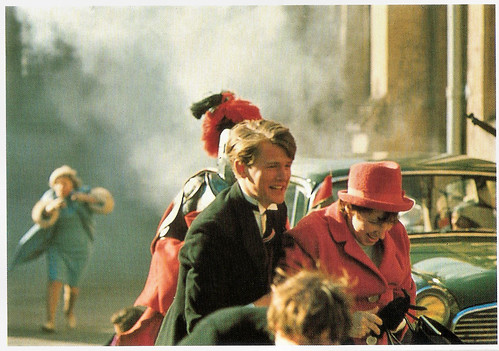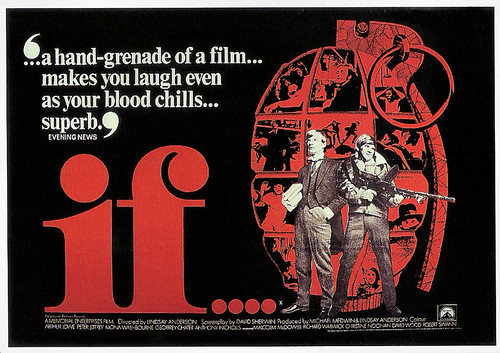The British film If... (1968), produced and directed by Lindsay Anderson, and starring Malcolm McDowell in his film debut, was a highly acclaimed but controversial drama. It paints a black picture of the British school system and, by extension, English society. Today we post a series of cards published for the British DVD release of the film in 2007.

British postcard by Paramount Pictures for the DVD release (2007), no. GI101327PK. Photo: Paramount Pictures. Publicity still for If... (Lindsay Anderson, 1968) with Malcolm McDowell.
In If... (Lindsay Anderson, 1968), rebellious students at an old established private school in England plan a violent revolt against their repressive environment.
The film centres on a small group of non-conformists led by Mick Travis (Malcolm McDowell in his first screen role). Seeing the powers-that-be as humourless, bureaucratic, and needlessly restrictive, Mick and his cohorts (including Richard Warwick and David Wood) indulge in small acts of rebellion, including sneaking into town to romance a local waitress (Christine Noonan). Their actions are discovered and punished with harsh beatings, leading the students to plot revenge.
Judd Blaise at AllMovie: "This effort culminates in the film's most famous sequence, a surrealistic depiction of a bloody uprising by the students against the adult world. Daring and unpredictable in content and form, If... mixes colour and black-and-white cinematography as easily as it mingles satire with dark fantasy."
If... is often compared to the French classic Zéro de conduite (Jean Vigo, 1933), which also featured surrealistic boarding-school rebellion. According to Wikipedia, Anderson acknowledged an influence, and described how he arranged a viewing of Zéro de conduite with his screenwriters, David Sherwin and John Howlett.

British postcard by Paramount Pictures for the DVD release (2007), no. GI101327PK. Photo: Paramount Pictures. Publicity still for If... (Lindsay Anderson, 1968) with Hugh Thomas, Robert Swann, Ben Aris, Arthur Lowe and Mary MacLeod.

British postcard by Paramount Pictures for the DVD release (2007), no. GI101327PK. Photo: Paramount Pictures. Publicity still for If... (Lindsay Anderson, 1968) with Christine Noonan.
The film's ambiguous attitude toward violence was fairly controversial in 1968. If... became a success among younger, counter-culture audiences who appreciated the audacious shock tactics and embraced the satirical, anti-establishment message. The film received BAFTA and Golden Globe nominations and won the Palme d'Or at the 1969 Cannes Film Festival.
Rebecca Flint Marx at AllMovie: "the film still has the power to shock, not so much because of its sex and violence (fairly tame by today's standards) but because of the manner in which they are presented. Resembling a landlocked Lord of the Flies, If... remains most startling for its depiction of savagery, on the part of both society (represented by the school and its authorities) and the young men it produces. It is a casual, offhand savagery, seemingly as much a part of British society as tea and scones. Lindsay Anderson's ambiguous approach to the film's violence is consistent with the film's blackly satirical tone, mirroring the aim being taken at societies across the world at the time by their dissatisfied youth."
If... has become a high point in the cinema of youth rebellion. His role earned Malcolm McDowell the part of Alex in the classic A Clockwork Orange (Stanley Kubrick, 1971). Director Lindsay Anderson and McDowell later collaborated on O Lucky Man! (1973), Look Back in Anger (1980), and Britannia Hospital (1982).
Shawn Taber at IMDb about If...: "This is one of the greatest films ever made, period! I've seen it at least 10 times, and it still manages to captivate me."

British postcard by Paramount Pictures for the DVD release (2007), no. GI101327PK. Photo: Paramount Pictures. Publicity still for If... (Lindsay Anderson, 1968).

British postcard by Paramount Pictures for the DVD release (2007), no. GI101327PK. Photo: Paramount Pictures. Poster for If... (Lindsay Anderson, 1968).
Sources: Rebecca Flint Marx (AllMovie), Judd Blaise (AllMovie), Shawn Taber (IMDb), Wikipedia and IMDb.

British postcard by Paramount Pictures for the DVD release (2007), no. GI101327PK. Photo: Paramount Pictures. Publicity still for If... (Lindsay Anderson, 1968) with Malcolm McDowell.
Daring and unpredictable in content and form
In If... (Lindsay Anderson, 1968), rebellious students at an old established private school in England plan a violent revolt against their repressive environment.
The film centres on a small group of non-conformists led by Mick Travis (Malcolm McDowell in his first screen role). Seeing the powers-that-be as humourless, bureaucratic, and needlessly restrictive, Mick and his cohorts (including Richard Warwick and David Wood) indulge in small acts of rebellion, including sneaking into town to romance a local waitress (Christine Noonan). Their actions are discovered and punished with harsh beatings, leading the students to plot revenge.
Judd Blaise at AllMovie: "This effort culminates in the film's most famous sequence, a surrealistic depiction of a bloody uprising by the students against the adult world. Daring and unpredictable in content and form, If... mixes colour and black-and-white cinematography as easily as it mingles satire with dark fantasy."
If... is often compared to the French classic Zéro de conduite (Jean Vigo, 1933), which also featured surrealistic boarding-school rebellion. According to Wikipedia, Anderson acknowledged an influence, and described how he arranged a viewing of Zéro de conduite with his screenwriters, David Sherwin and John Howlett.

British postcard by Paramount Pictures for the DVD release (2007), no. GI101327PK. Photo: Paramount Pictures. Publicity still for If... (Lindsay Anderson, 1968) with Hugh Thomas, Robert Swann, Ben Aris, Arthur Lowe and Mary MacLeod.

British postcard by Paramount Pictures for the DVD release (2007), no. GI101327PK. Photo: Paramount Pictures. Publicity still for If... (Lindsay Anderson, 1968) with Christine Noonan.
Power to Shock
The film's ambiguous attitude toward violence was fairly controversial in 1968. If... became a success among younger, counter-culture audiences who appreciated the audacious shock tactics and embraced the satirical, anti-establishment message. The film received BAFTA and Golden Globe nominations and won the Palme d'Or at the 1969 Cannes Film Festival.
Rebecca Flint Marx at AllMovie: "the film still has the power to shock, not so much because of its sex and violence (fairly tame by today's standards) but because of the manner in which they are presented. Resembling a landlocked Lord of the Flies, If... remains most startling for its depiction of savagery, on the part of both society (represented by the school and its authorities) and the young men it produces. It is a casual, offhand savagery, seemingly as much a part of British society as tea and scones. Lindsay Anderson's ambiguous approach to the film's violence is consistent with the film's blackly satirical tone, mirroring the aim being taken at societies across the world at the time by their dissatisfied youth."
If... has become a high point in the cinema of youth rebellion. His role earned Malcolm McDowell the part of Alex in the classic A Clockwork Orange (Stanley Kubrick, 1971). Director Lindsay Anderson and McDowell later collaborated on O Lucky Man! (1973), Look Back in Anger (1980), and Britannia Hospital (1982).
Shawn Taber at IMDb about If...: "This is one of the greatest films ever made, period! I've seen it at least 10 times, and it still manages to captivate me."

British postcard by Paramount Pictures for the DVD release (2007), no. GI101327PK. Photo: Paramount Pictures. Publicity still for If... (Lindsay Anderson, 1968).

British postcard by Paramount Pictures for the DVD release (2007), no. GI101327PK. Photo: Paramount Pictures. Poster for If... (Lindsay Anderson, 1968).
Sources: Rebecca Flint Marx (AllMovie), Judd Blaise (AllMovie), Shawn Taber (IMDb), Wikipedia and IMDb.
No comments:
Post a Comment